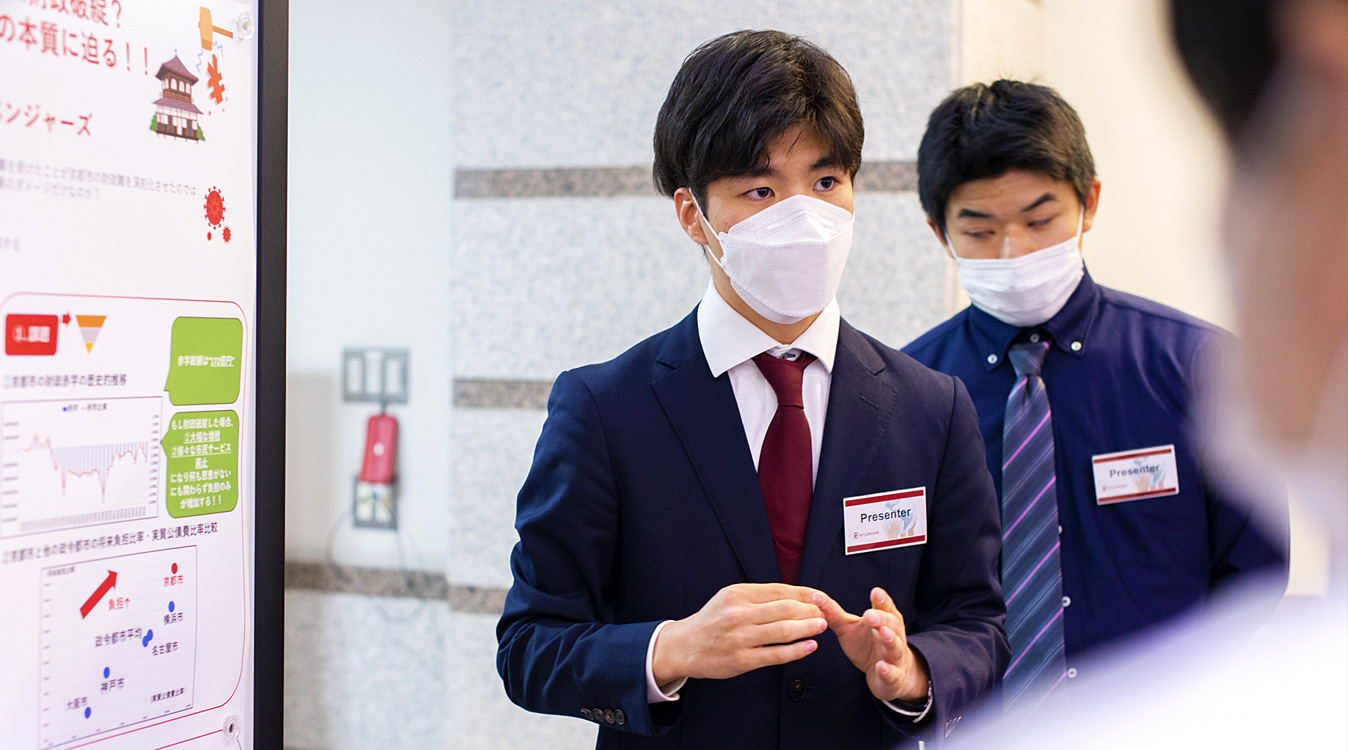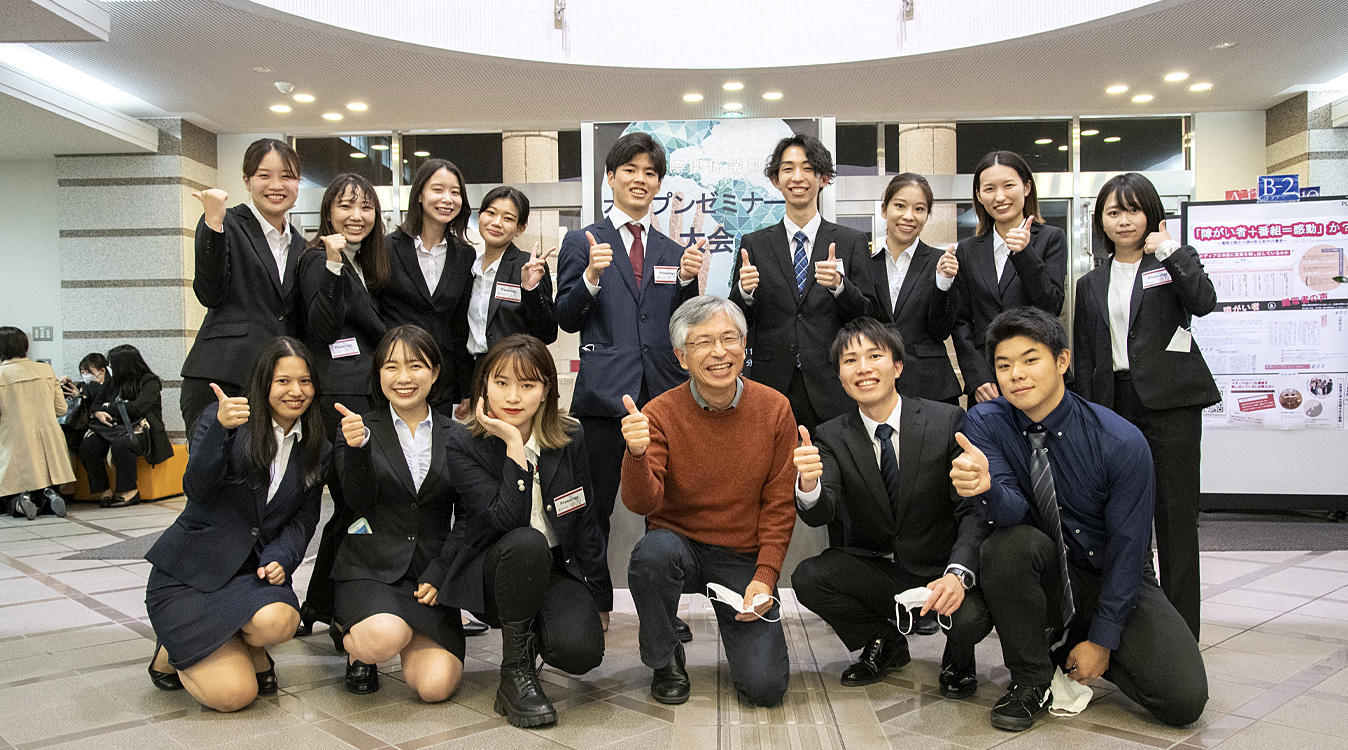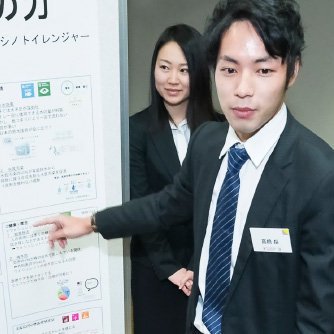Zemi Research Convention 2021
"Kyoto is a city of a thousand years, but will it go bankrupt within 10 years? The true nature of Kyoto's financial mess!"
KIM Minsu, YOSHIYAMA Shoka, YONEMARU Hina, WAKU Ayaka, IKEDA Keisuke, YASUHARA Chiharu, HAMADA Miku
We interviewed the members of the Itaki seminar, who presented "Kyoto is a city of a thousand years, but will it go bankrupt within 10 years? The true nature of Kyoto's financial mess!" at the 2021 College of International Relations Zemi Research Convention.
Please give details of your Zemi Research Convention presentation.
"A thousand-year-old city will go bankrupt within ten years? The true nature of Kyoto's financial mess!" was the theme of our presentation. The purpose was to clarify the nature of the financial crisis in Kyoto City and the threat of collapse. The presentation was divided into three tiers of analysis: (1) problems, (2) factors, and (3) true causes.
(1) Issues: we explained the current state of Kyoto's budget deficit by comparing the city's historical financial situation with that of other government-designated cities.
(2) Factors: we explained that there are five causes of budget deficits in terms of increased expenditure and decreased revenue: "policy failure, corona, population decline due to low birthrate and ageing population, culture and religion, and relationship with the government.
(3) True causes: we concluded that Kyoto City lacks management skills of money, risk, and structure.
Why did you choose your theme?
We started preparing for the research in the first half of September. Our Ritsumeikan University is located in Kyoto and we learned from the news that the city of Kyoto is facing a huge budget deficit (so-called city bankruptcy) due to the decline in tourists and the worsening economy caused by the Corona pandemic. We studied international economics in our seminar, but we decided to focus on a domestic theme for The Zemi Research Convention. We chose this topic because we thought it was a current and personal issue.

What questions and comments did you receive at the Zemi Research Convention, and which made the most impact on your group?
One of the most memorable moments of the convention was when a former local government employee who worked at the city hall listened, asked us questions and gave us feedback. It was very compelling and helped us to deepen our research and learning.
We prepared a list of possible questions to respond smoothly in the question and answer session, but we received unexpected questions and comments from different perspectives in the presentation. We were not able to learn enough, but at the same time, we were able to gain new knowledge that we could not have achieved on our own.
What kind of things did you experience as a group leading up to the convention?
There was so much data and materials regarding Kyoto city finances that it was difficult to understand. We attempted to summarise the enormous amount of information in a concise and easy-to-understand poster. We summarised the information into graphs and tables for the audience and ourselves to comprehend the information.
It was challenging to set up a straightforward research question and theme. The hardest part was clarifying the meaning and goal of our research: "Why are we researching this topic?". We reached the final goal and conclusion as a group by focusing on one point: to clarify the "essence" of the budget deficit problem.
What did you learn through the Zemi Research Convention you can apply to your future career?
We had many discussions as a team on the theme to deepen our learning through analysis and research, and were able to output our findings in a presentation. The discussions have led to learning and growth in our seminar study.
We learned about researching and many things that we can use in our future lives, such as the skills to explain in an easy-to-understand way and the importance of group work. A third person's point of view allowed us to recognise the need to always look at things from a broader perspective.
Message to the next year's participants
The best thing about the Zemi Research Convention is that we could work together as a group to deepen our understanding of a topic. Working together as a team is a great experience. When you get stuck or can't see the goal, ideas that you wouldn't have thought of on your own can be found through the group.
Participating in the Zemi Research Convention can be challenging, but there is so much to gain, such as a new perspective on learning and teamwork. I hope that future students will consider taking part in the event.
Introduction of the seminar
We have been studying international economics in the Itaki Seminar this year. In the Spring Semester of our third year, we mainly learned the basics of understanding today's international economy, such as trade, investment and finance, using Professor Itaki's original teaching materials. From the summer vacation, we read literature and studied the topic of "digital currency" within the world of international political economy and its impact on our daily lives.
In the autumn semester of our third year, we all wrote a joint paper, a unique feature of the Itaki Seminar.
Professor Itaki is very kind and gives us gentle and accurate advice when we don't understand something. We gain new perspectives through discussions amongst students and professors, which is always inspiring.
Professor Itaki is excellent at explaining things, and he teaches everyone about economics from the basics. He is also very good at leading discussions; students naturally start discussions with one another in class. He pays close attention to each of us and actively participates in exchanges and activities with other seminar students outside of class.
One of the main attractions of the Itaki Seminar is that we have the chance to interact not only with current students but also with people in the workforce who are alumni of Itaki Seminar from the past 30 years.

March 2022
MORE INTERVIEWS
-
International collaboration is not merely an ideal, but something that is both achievable and essential
Tran Duc Tuan (Steven)
Honda (Graduate School of International Relations Alumnus 2015)2026.2.13
alumni|
-
Zemi Research Convention 2025 “Where do we find the laughter?”
JDP Team
(Team name: The Japarican: Trans-Pacific Humor Accord)2026.2.3
academics|jdp|openseminar|
-
Diversifying opportunities and improving oneself by crossing borders
Jameel Mikaheel Yamaguchi
Fourth-year Global Studies Major2026.1.26
studyabroad|international|gs_major|
-
I participated in the Peace Studies Seminar and engaged in meaningful discussions with peers who shared a commitment to deepening our understanding of peacebuilding and broadening our perspectives.
ONG Kristen Valeria
Second-year Global Studies Major / International Student from Singapore2025.11.5
studentlife|academics|gs_major|
-
The Bangkok International Organization Training Program Taught Me the Importance of Understanding Regions from a Broad Perspective — I Aspire to Build a Career in International Politics
RINALDI Christian Giuseppe
Second-year Joint Degree Program (AU-home)2025.10.22
academics|international|jdp|
-
Developing my Japanese proficiency enabled me to engage in a wide range of experiences during my time in Japan.
DAO NGUYEN BAO Ngoc
Third-year Global Studies Major / International Student from Vietnam2025.9.26
studentlife|international|gs_major|
